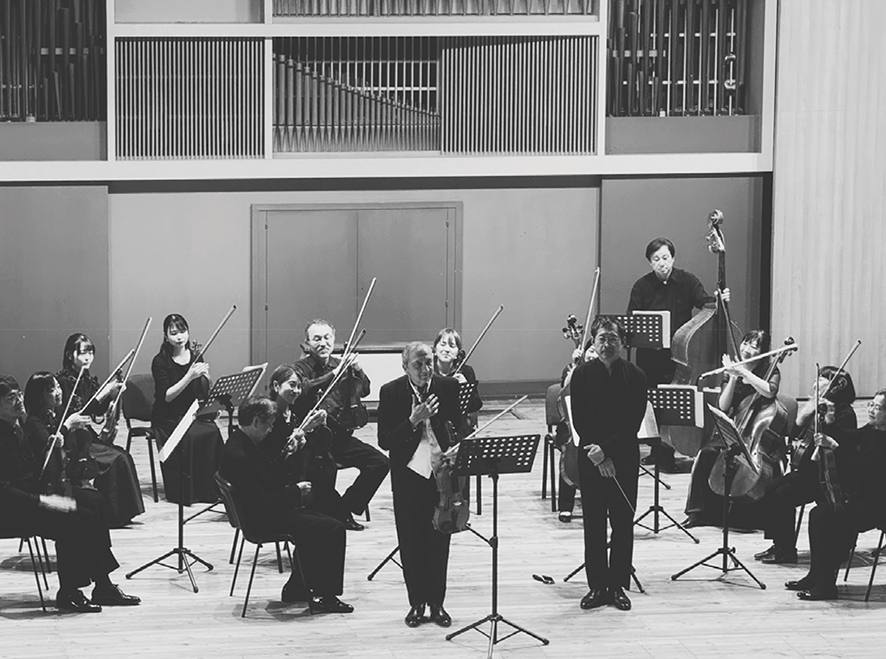The Grand Hall of the Tbilisi State Conservatoire witnessed an extraordinary convergence of musical traditions and histories as the Japanese string ensemble Ensemble Kobe took to the stage. Led by flutist-conductor Tadahiro Yano and violist-conductor Zaza Gogua, the evening’s program wove a profound narrative of resilience, remembrance, and reinvention, spanning from Beethoven to contemporary Georgian and Japanese composers.
Beethoven, Mahler, and the Weight of History
The evening opened with Ludwig van Beethoven’s String Quartet No. 11 in F minor, Op. 95, aptly nicknamed Serioso, arranged with Gustav Mahler’s characteristic orchestral sensibilities. As the strings plunged into Beethoven’s unrelenting intensity, the tension between storm and serenity felt palpable.
Ensemble Kobe’s interpretation emphasized the quartet’s compressed energy, its terse statements and explosive bursts of emotion made all the more vivid in this larger orchestral arrangement. The Mahlerian expansion of the work amplified its late-Beethovenian drama, transforming the quartet into something orchestral yet intimate—a bridge between chamber music’s intricacy and the symphonic vastness that would define the 19th century.
Saegusa’s Requiem: A Lament for the Fragile Earth
A striking shift in tone followed with Shigeaki Saegusa’s Requiem for the Earthquake Victims. This solemn piece, dedicated to those lost in natural disasters, carried a raw emotional weight that resonated deeply with both the Japanese and Georgian audiences, two nations familiar with the devastating power of seismic tremors. Yano’s delicate conducting sculpted the ensemble’s sound into an ethereal lament, the strings evoking waves of sorrow and resilience. The music’s stark beauty was not merely a tribute but a reminder of the impermanence of human existence.
Tsintsadze’s Six Miniatures: A Georgian Jewel in a New Light
A highlight of the evening was Sulkhan Tsintsadze’s Miniatures for String Orchestra, a work that captures the essence of Georgian folk idioms within a refined classical framework. Under the baton of Zaza Gogua the ensemble approached Tsintsadze’s rhythmic dynamism and modal richness with remarkable sensitivity, allowing the intricate interplay of voices to unfold with both precision and passion. Each miniature offered a different facet of Georgian musical heritage, transforming the concert hall into a vibrant sonic landscape of ancient dances, playful exchanges, and melancholic reflections.

Nishimura’s Adagio: A Japanese Elegy for a European Master
Akira Nishimura’s Adagio in Memory of Wolfgang Schulz served as an elegant meditation on loss and legacy. The work, dedicated to the late Austrian flutist, felt both personal and expansive, as if time itself had momentarily stood still. The ensemble navigated Nishimura’s shimmering textures with a sense of reverence, the music unfolding like a series of gentle waves. Subtle dissonances and delicate phrasing lent the piece an otherworldly quality, reinforcing the evening’s overarching theme of remembrance and transcendence.
Azarashvili’s Cello Concerto Reimagined: Viola’s Lament and Defiance
In a bold move, Zaza Gogua presented a viola arrangement of Vaja Azarashvili’s Cello Concerto, transforming the piece into an introspective dialogue between soloist and ensemble. The viola’s darker timbre lent a new shade of expressivity to the concerto’s lyrical passages, while its agility brought new nuances to the more dramatic sections. Gogua’s playing balanced vulnerability with virtuosity, making a compelling case for the viola as an instrument capable of carrying the weight of a concerto traditionally reserved for the cello.
Akutagawa’s Triptych: A Fiery Finale
The evening closed with Yasushi Akutagawa’s Triptych for Strings, an exhilarating fusion of Japanese and Western influences. The piece’s driving rhythms, sharp contrasts, and relentless energy provided a fittingly electrifying conclusion. Ensemble Kobe’s execution of Akutagawa’s rapid shifts between aggression and lyricism highlighted the work’s cinematic qualities, leaving the audience enthralled.
A Night of Musical Dialogue Beyond Borders
The concert was not merely a showcase of virtuosity but a deeply thoughtful exploration of cross-cultural musical expressions. By juxtaposing Western classical cornerstones with contemporary Georgian and Japanese compositions, Ensemble Kobe illuminated the interconnectedness of musical traditions across continents and centuries. In a world often divided by cultural and historical differences, the evening served as a testament to music’s power to transcend borders, offering a space where memory, mourning, and celebration could coexist in harmony.
As the final notes faded into the grandeur of the Conservatoire’s hall, it was clear that this was more than just a concert—it was a bridge, an echo, and a deeply resonant conversation between Japan and Georgia, past and present, grief and hope.
By Ivan Nechaev














